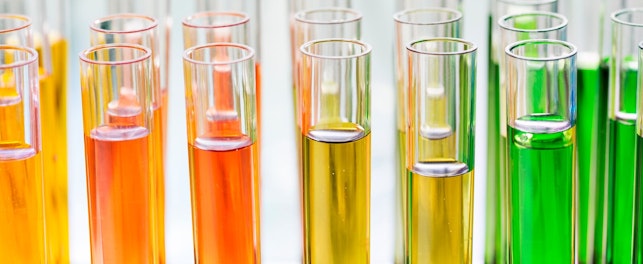On July 8, 2021, the European Chemical Agency (ECHA) added eight new substances of very high concern (SVHC) to the Candidate List, bringing the total number of entries to 219.
On July 8, 2021, the European Chemical Agency (ECHA) added eight new substances of very high concern (SVHC) to the Candidate List [1]. Some of them represent a group with more than one substance and the additions bring the total number of SVHC entries to 219.
The eight new SVHCs are:
- 1,4-dioxane
- Classified as Carc. 1B and included in Annex VI of the Regulation (EC) 1272/2008 on Classification, Labeling and Packaging of Substances and Mixtures (CLP Regulation) in 17th ATP published on May 28, 2021
- 2,2-bis(bromomethyl)propane1,3-diol (BMP); 2,2-dimethylpropan-1-ol, tribromo derivative/3-bromo-2,2-bis(bromomethyl)-1-propanol (TBNPA); 2,3-dibromo-1-propanol (2,3-DBPA)
- 2-(4-tert-butylbenzyl)propionaldehyde and its individual stereoisomers
- 4,4'-(1-methylpropylidene)bisphenol
- Glutaral
- Medium-chain chlorinated paraffins (MCCP) (UVCB substances consisting of more than or equal to 80% linear chloroalkanes with carbon chain lengths within the range from C14 to C17)
- Orthoboric acid, sodium salt
- Phenol, alkylation products (mainly in para position) with C12-rich branched or linear alkyl chains from oligomerisation, covering any individual isomers and/ or combinations thereof (PDDP)
Obligations for Article Producers and Importers
According to Article 33 of Registration, Evaluation, Authorization and Restriction of Chemicals (REACH), European Union (EU) and European Economic Area (EEA) manufacturers and importers of articles are required to provide information to allow the safe use of products by the recipients upon supply, and to consumers within 45 days upon request, when the concentration of the SVHC in the article exceeds 0.1% (w/w). For articles that contain an SVHC in which the concentration is above 0.1%, with the quantity over one tonne per year, a notification must be submitted to ECHA by the manufacturers or the importers under Article 7 of REACH. The notification of SVHCs in an article must be made within six months of their inclusion on the List. The notification deadline for the eight new SVHCs added to the Candidate List is January 8, 2022.
As of January 5, 2021, EU producers, importers, assemblers and distributers of articles containing above 0.1% w/w of a SVHC on the Candidate List must submit a notification to the Substances of Concern In articles, or in complex objects (Products) to the (SCIP - the database for information on Substances of Concern In articles as such or in complex objects (Products)) database under the Waste Framework Directive (WFD).
The potential uses of these new SVHC candidates are summarized in Table 1.
Table 1. Possible uses of the new SVHCs in the Candidate List published by ECHA on July 8, 2021

Abbreviations
- Carc. 1B: Carcinogenicity category 1B
- ED: Endocrine disrupting properties
- Ev. C: Equivalent level of concern
- PBT: Persistent, bioaccumulative and toxic
- Repr. 1B: Toxic to reproduction category 1B
- UVCBs: Substance of unknown or variable composition, complex reaction products or biological materials
- vPvB: Very persistent and very bioaccumulative
SVHCs may be introduced into various consumer products due to the complexities of both the supply chain and production process. Identifying high risk products or materials, or employing a thorough test strategy, can be a smart way to ensure compliance and save costs. In the end, it’s only trusted because it’s tested. Contact us to find out more about how we can assist your business or visit our website.
For inquiries, please contact:
Emily Lam
Research and Development Manager
t: +852 2204 8339
© SGS Group Management SA - 2021 - All rights reserved - SGS is a registered trademark of SGS Group Management SA. This is a publication of SGS, except for 3rd parties’ contents submitted or licensed for use by SGS. SGS neither endorses nor disapproves said 3rd parties contents. This publication is intended to provide technical information and shall not be considered an exhaustive treatment of any subject treated. It is strictly educational and does not replace any legal requirements or applicable regulations. It is not intended to constitute consulting or professional advice. The information contained herein is provided “as is” and SGS does not warrant that it will be error-free or will meet any particular criteria of performance or quality. Do not quote or refer any information herein without SGS’s prior written consent.



